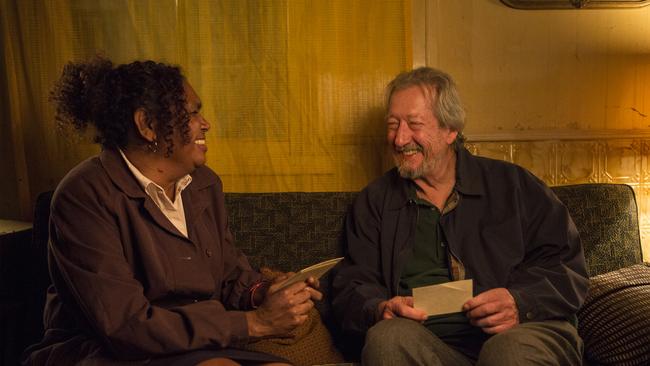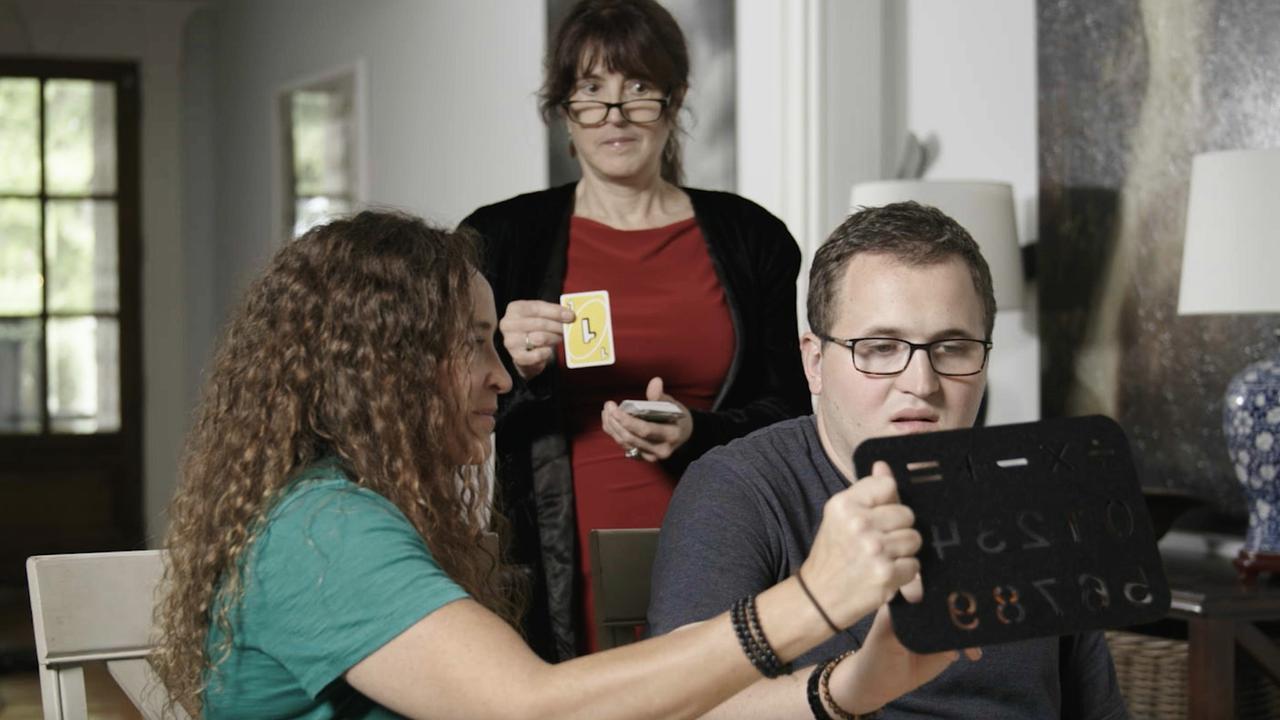Last Cab to Darwin lured Ningali Lawford-Wolf out of retirement
Ningali Lawford-Wolf is back on the big screen in a role she found too good to refuse.

Ningali Lawford-Wolf came out of a quiet retirement, of sorts, to play a pivotal role in Last Cab to Darwin.
She turned down director Jeremy Sims four times despite his plea that he and playwright Reg Cribb had adapted the hit play for cinema with her specifically in mind for the role of the neighbour and beau of Rex, the lead character played by Michael Caton.
“I told Jeremy the only way he could convince me, if he really wanted me, was to come to [her then West Australian coastal home] Kalbarri to read the script,” she says, smiling.
“He did, and he made me cry. I looked at him and said: ‘You arsehole, now you probably expect me to do it?’ ”
She did, after falling in love with the tale, which is a road movie, love story and existential drama based on the 1996 journey of a Broken Hill taxi driver who drove to Darwin to “take advantage” of the short-lived euthanasia legislation in the Northern Territory.
Lawford-Wolf has been an enigmatic cinema and stage presence since turning her training at the Aboriginal Islander Dance Theatre in Sydney into a revelatory solo show, Ningali, written with Angela Chaplin and Robyn Archer. That show was strong enough to tour globally, including to the Edinburgh Festival in 1995.
She has since popped up on stage or in occasional seminal screen works such as Rabbit-proof Fence and Bran Nue Dae.
The woman with the broadest grin in Australian film screams at the memory of that Edinburgh show: “Oh my goodness!” It was her first foray into writing and as an actor — though she recalls not actually thinking she would be an actor, even in subsequent years when people told her she was accomplished at it. “I don’t consider myself as, I don’t know, being that — the cliche word for it. I just love what I do. And I just love being given a good script.”
She doesn’t recall having any career expectations back then, certainly not the expectations others might have had. Her aim remains just wanting to prove to herself she can do it.
“For somebody who grew up in the Kimberley and had never spoken any English for a long time, a foray into this kind of world was unbelievable for me,” she says.
“But it was always like just proving to myself that I could do that. And working alongside people I admire is a bonus.”
Her “retirement” was a “self-imposed hiatus from everything” wherein she could “chill a bit” with her children back in her home town of Fitzroy Crossing. She works for the Fitzroy Valley District High School and for Role Models Australia in encouraging high school indigenous girls to continue their schooling and aim high for university or work.
Fitzroy Crossing is a tough town and aspirations can be quashed. “It is and you have to be tough to come from Fitzroy Crossing and it taught me a lot, but it’s a good time to go back and give back,” she says.
Ningali isn’t a star there: she’s a niece, mother, aunty or granddaughter, and she loves it. “I think it’s pivotal that we as parents and as a community remember to be involved in kids education and to say we support them and encourage them to discover what’s out there,” she says.
“That was one of the biggest things that came from my dad, in terms of saying education was pivotal.”
Her education and aspiration came from such encouragement. She was born on Christmas Creek Station in the Kimberley, where her father was a drover and her mother a domestic.
She saw movies at school that were projected outdoors. They slowly opened up other worlds. Initially, westerns and war movies predominated until the revelatory The Sound of Music, in which the young girl could see there was more to the world than cowboys and Indians and John Wayne.
Lawford-Wolf recalls that subconsciously the films prompted a question in her mind: how do you do that?
When she moved to high school in Perth, she saw her first play with indigenous people: Ernie Dingo and Lynette Narkle performing a trilogy of Jack Davis plays.
“Seeing a full-on indigenous cast when I was 13, 14, it was ‘Wow! There are Aboriginal people doing theatre!’ ”
The more she looked, the more she discovered, including the nascent indigenous theatrical movement in Sydney’s Redfern led by people such as Bob Maza and Gary Foley.
“That was an eye-opening thing for me, and I thought ‘How do I get to do that?’ ” she recalls. “But I went about it in a roundabout, longwinded way! I started as a dancer and went to AIDT — NAISDA [National Aboriginal and Islander Skills Development Association] now — and thought I’d give it a shot and see how it works out. But I was never going to be a ballet dancer. Hello!”
It worked out well, she says, although “acting is a job for me, it’s not the be-all and end-all”.
Professionally, Ningali-Wolf says it is lovely stepping into the role played in the stage production by one of her idols, Justine Saunders.
“She was the lady we grew up watching, that gave us the push into being actors,” she says. “Oh my god, I can step into her shoes? I was scared. I was very scared actually.”
Ningali-Wolf and Caton forge a wonderful on-screen relationship as the beautiful mixed-race couple in a rural town.
Despite Polly and Rex’s childish spats and Rex’s reticence and “not holding hands publicly, we know in ourselves we actually love and care for each other”, she says.
It is but one sweet aspect of a charming movie also starring Jacki Weaver, who reprises her stage role. And the occasional actor loves it.
“I’m probably my worst critic but this is one of my first films that I actually enjoy and people keep telling me they enjoy it too,” she says.
So what are viewers connecting to particularly: their love story; the road trip; the euthanasia battle; Rex’s journey?
“It’s just got the vibe,” Lawford-Wolf says with a grin.
Last Cab to Darwin is open nationally.


